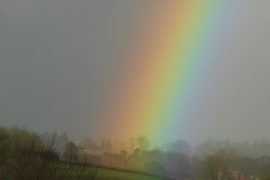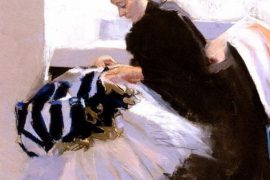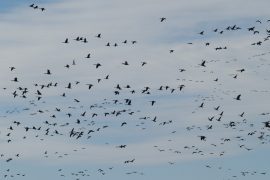"Why We Need Ponds"
To break the monotony of crops
we need ponds to be, on our home places,
the eyes that never close
as their grass lashes go to seed.
To collect what clouds drop
we need ponds, to let rain run
into rills, to let
grasses grow on their banks so that
rills don’t become runnels,
so that snow melts and sinks in
as few things do.
We need ponds to let all waters
have a destination part of a cycle.
*
We need ponds to teach us patience.
When the water we prepared for doesn’t come
we will have time to build a reef
the water rises and algae grows to cover
to stock the basin with fish and imagine them
trance-like with their lidless eyes and slight
correcting motions in the reef. [Finally]
one day the pond will have become
a sanctuary for mating dragonflies
and coyotes tired of wandering the sandy beds
of old, high-walled creeks.
*
After such an effort
what might we become?
After changing the map
moving the horizon
of a place whose every dip
and roll every living
being thought it knew?
Once we have changed the weather
because it’s not humid
enough in Greentop in August,
after changing the soundscape
so the whippoorwills and bluebirds
have migrating companions,
on the day the trees finally
see themselves in the pond’s
mirror may we be
the reflection that fractures when
something lands on the pond’s
placid surface breaking us
into a loving eye,
an awakened ear,
an open hand.
"Jesus In Three Movements"
I.
Before the border walls
there were mission walls.
At Tumacacori they crumbled
to Sonoran sand
and the fossilized pits
of Fr. Kino’s peaches.
Jesus replants the mission
orchard with the oldest
root stock he can find.
In downtown Tucson yards
abuelas keep alive
the old world stock—
black mission figs.
From cuttings to seedlings Jesus
nurses the trees, plants them
near the old acequia,
wraps their slender trunks
to protect them.
II.
Layers of checkpoints at Nogales,
first, out on the interstate,
a sun-baked shipping container
their makeshift detention center.
North of the crossing people wrapped
in blue tarps slept on the highway.
Jesus warned us away from vendors
selling home-canned goods
and plastic bags of quesadilla.
He sang corridas as our bus
wound its way up the mountain,
sang us past a huge truck
overturned on the road’s edge ,
sang us by the smoldering fires
left by people going north
through the Sonoran desert.
At Santiago de Cocospera
he shook his head at pieces
of the crumbling church stored in a shed
while the tin nailed to what was left
of Cocospera tore off
in a hot wind. Acres
of white plastic greenhouses
below us in the valley. From where
comes the water?
III.
You don’t know what richness is,
Jesus said, knocking on
an old woman’s door. She kept
keys to the white-washed mission,
San Ignacio Sonora. He wanted
us to see her walled garden--
quince fig lime lemon.
Taste this, he said, pulling a lime
from a branch, cutting it into
slivers. Old world stock planted
along an acequia. A screened
kitchen around a huge copper
pot to cook the quince down.
Taste this, he said, shaving a block
of quince paste into small bites.
Parakeets and parrots chattered
in their cages. These are
the keys to the kingdom.





